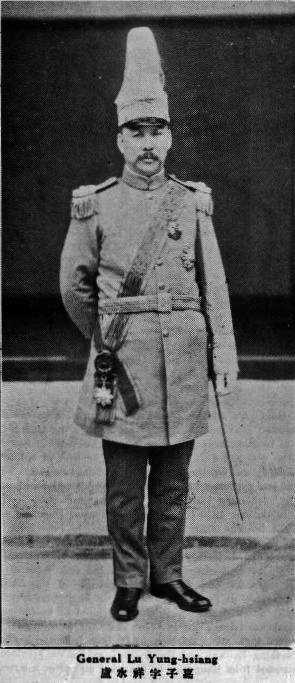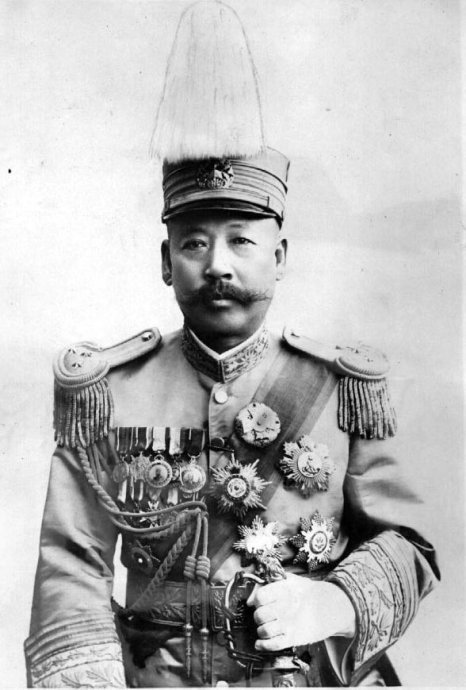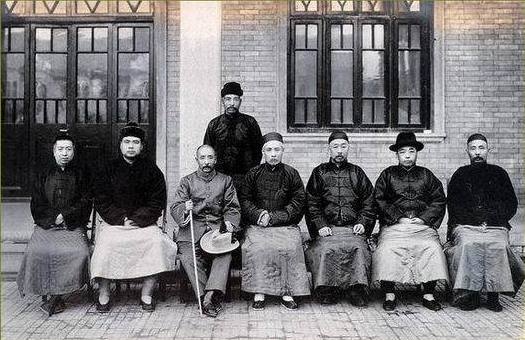|
Lu Yongxiang (warlord)
Lu Yongxiang, (; October 22, 1867 – May 15, 1933), Anhui clique warlord, military governor of Zhejiang, Zhili, and Jiangsu. Lu Yongxiang was born October 22, 1867, in Jiyang, Shandong, China. Impoverished as a child, he joined the Huai Army in 1890. In 1895 he joined the new Beiyang Army, rising to brigade commander. At the time of the 1911 Xinhai Revolution Lu was given command of the Beiyang 3rd Division. After the Republic of China was established, Lu was appointed commander of the Beiyang Tenth Division, guarding Zhejiang. For joining Duan Qirui, as part of the Anhui clique Lu was made military governor of Zhejiang from August 14, 1919 to September 7, 1924. Near the end of his term as Zhejiang governor he fell out with his counterpart, Jiangsu governor Qi Xieyuan, over control of Shanghai and their conflict became the First Jiangsu-Zhejiang War. Lu was defeated by Qi and his Zhili clique allies, most importantly Sun Chuanfang, when Sun attacked from the south. His cont ... [...More Info...] [...Related Items...] OR: [Wikipedia] [Google] [Baidu] |
Lu (surname 卢)
Lu, Lü, or LU may refer to: Arts and entertainment * Lu (music), Tibetan folk music * Lu (duo), a Mexican band ** Lu (album), ''Lu'' (album) * Character from Mike, Lu & Og * Lupe Fiasco or Lu (born 1982), American musician * Lebor na hUidre, a manuscript containing many Irish fictional stories commonly abbreviated LU *Lu (novel), 2018 novel by Jason Reynolds Chinese surnames *Lu (surname), including: **Lu (surname 卢), the 52nd commonest **Lu (surname 陆), the 61st commonest **Lu (surname 鲁), the 115th commonest **Lu (surname 路), the 116th commonest **Lu (surname 芦), the 140th commonest **Lu (surname 禄) **Lu (surname 逯) **Lu (surname 鹿) *Lü (surname), 吕, the 47th commonest Places Asia *Lu (state) of ancient China, in today's Shandong Province *Lü (state), an ancient Chinese state *Lu Commandery, of ancient China *Lù, a circuit (administrative division) in China *Lu, Iran, Isfahan Province *Lu County, Sichuan, China *La Union, Philippines, from its initials ... [...More Info...] [...Related Items...] OR: [Wikipedia] [Google] [Baidu] |
Zhili Clique
The Zhili clique () was one of several mutually hostile cliques or factions that split from the Beiyang clique during the Republic of China's Warlord Era. This fragmentation followed the death of Yuan Shikai, who was the only person capable of keeping the Beiyang Army together. It was named for the general region of the clique's base of power, Zhili Province, now Hebei, and during its height also controlled Jiangsu, Jiangxi, and Hubei. Unlike other cliques, this one was formed by officers who felt discriminated against by Premier Duan Qirui in matters of appointment and promotions. They rallied around President Feng Guozhang who had to share power with Duan's dominant Anhui clique in the Beiyang government. Lacking strong bonds, they were more willing to abandon or betray one another. They advocated a softer line during the Constitutional Protection War. After Feng's natural death, leadership passed to Cao Kun. Cao was victorious in the Zhili–Anhui War (1920) though the cre ... [...More Info...] [...Related Items...] OR: [Wikipedia] [Google] [Baidu] |
Jianqiao Airfield
Hangzhou Jianqiao Airport (), formerly romanized as Chien Chiao, also known as Hangzhou Air Base, is a People's Liberation Army Air Force Base and a former civil airport serving Hangzhou, the capital city of Zhejiang Province, China. It is located in the town of Jianqiao () in Jianggan District, about 7 miles northeast of the city center. Jianqiao Airport served as Hangzhou's main airport until 29 December 2000, when all commercial flights were transferred to the newly built Hangzhou Xiaoshan International Airport. History Jianqiao was developed into an airfield and flight training institute in 1922 under support and directives of the List of warlords and military cliques in the Warlord Era, Anhui clique warlord Lu Yongxiang (warlord), Lu Yongxiang and World War I veteran ace fighter pilot Zhu Binhou, with a squadron of aircraft that included Breguet 14s. Jianqiao air force base was then consolidated in 1931 in wake of the Mukden Incident by the Nationalist Government (China), N ... [...More Info...] [...Related Items...] OR: [Wikipedia] [Google] [Baidu] |
Order Of Wen-Hu
The Order of Wen-Hu (English – The Order of the Striped Tiger) was an award for military or naval service awarded by the Republic of China. It was issued in five classes. The badge showed a striped tiger in natural colours on a central medallion. During World War I, a large number of Chinese served with both the Chinese Labour Corps and the Royal Army Medical Corps, and many British officers, particularly in those two corps, received the order. The majority were issued in February 1920. Notable recipients *British Major R. V. C. Bodley *British Admiral of the Fleet Sir Osmond de Beauvoir Brock *U.S. Navy Officer Walter S. Crosley *British Colonel Bryan Fairfax *Lieutenant General Sir Humfrey Myddelton Gale *Japanese General Tanaka Giichi *U.S. Admiral Albert Gleaves *British Brigadier General Frederick Kisch *British Field Marshal Frederick Rudolph Lambart, 10th Earl of Cavan *British Admiral of the Fleet Sir Charles Madden, 1st Baronet *British Missionary William Edward ... [...More Info...] [...Related Items...] OR: [Wikipedia] [Google] [Baidu] |
Order Of The Golden Grain
The Order of the Precious Brilliant Golden Grain (Order of Chia-Ho ()), more simply the Order of the Golden Grain, was an award of the Republic of China. The award consists of nine classes. Recipients * Francis Aglen * Albert I of Belgium * William Beckett (engineer) * Léon Bourgeois * Emily Susan Hartwell * Frederick Maze * Johan Wilhelm Normann Munthe * John J. Pershing * Westel W. Willoughby * Sir Henry Wilson, 1st Baronet See also * Order of the Double Dragon: Imperial Chinese award * Order of Brilliant Jade The Order of Brilliant Jade is a civilian order of the Republic of China that can be worn only by the head of a nation. According to regulations, the order can only be presented by the president of the country or an emissary expressly dispatched ...: Later ROC award External links Picture of 2nd class medal勳章 ORDERS AND DECORATIONS China 中國 Orders, decorations, and medals of the Republic of China Awards established in 1912 1912 establishments ... [...More Info...] [...Related Items...] OR: [Wikipedia] [Google] [Baidu] |
Order Of Rank And Merit
Order, ORDER or Orders may refer to: * Categorization, the process in which ideas and objects are recognized, differentiated, and understood * Heterarchy, a system of organization wherein the elements have the potential to be ranked a number of different ways * Hierarchy, an arrangement of items that are represented as being "above", "below", or "at the same level as" one another * an action or inaction that must be obeyed, mandated by someone in authority People * Orders (surname) Arts, entertainment, and media * ''Order'' (album), a 2009 album by Maroon * "Order", a 2016 song from ''Brand New Maid'' by Band-Maid * ''Orders'' (1974 film), a 1974 film by Michel Brault * ''Orders'', a 2010 film by Brian Christopher * ''Orders'', a 2017 film by Eric Marsh and Andrew Stasiulis * ''Jed & Order'', a 2022 film by Jedman Business * Blanket order, purchase order to allow multiple delivery dates over a period of time * Money order or postal order, a financial instrument usually intende ... [...More Info...] [...Related Items...] OR: [Wikipedia] [Google] [Baidu] |
Tianjin
Tianjin (; ; Mandarin: ), alternately romanized as Tientsin (), is a municipality and a coastal metropolis in Northern China on the shore of the Bohai Sea. It is one of the nine national central cities in Mainland China, with a total population of 13,866,009 inhabitants during the 2020 Chinese census. Its built-up (''or metro'') area, made up of 12 central districts (all but Baodi, Jizhou, Jinghai and Ninghe), was home to 11,165,706 inhabitants and is also the world's 29th-largest agglomeration (between Chengdu and Rio de Janeiro) and 11th- most populous city proper. It is governed as one of the four municipalities under the direct administration of Chinese central government and is thus under direct administration of the State Council. Tianjin borders Hebei Province and Beijing Municipality, bounded to the east by the Bohai Gulf portion of the Yellow Sea. Part of the Bohai Economic Rim, it is the largest coastal city in Northern China and part of the Jing-Jin-Ji megap ... [...More Info...] [...Related Items...] OR: [Wikipedia] [Google] [Baidu] |
Zhang Zuolin
Zhang Zuolin (; March 19, 1875 June 4, 1928), courtesy name Yuting (雨亭), nicknamed Zhang Laogang (張老疙瘩), was an influential Chinese bandit, soldier, and warlord during the Warlord Era in China. The warlord of Manchuria from 1916 to 1928, and the military dictator of the Republic of China in 1927 and 1928, he rose from banditry to power and influence. Backed by Japan, Zhang successfully influenced politics in the Republic of China during the early 1920s. In the fall of 1924, during the Second Zhili–Fengtian War, he invaded and gained control of Peking, including the internationally recognized government, in April 1926. His appointment as grand marshal of the Republic of China in June 1927 represented the height of his success, but was quickly followed by defeat: the economy of Manchuria, the basis of his power, was overtaxed by his adventurism and collapsed in the winter of 1927; and he was defeated by the National Revolutionary Army of the Kuomintang under Gener ... [...More Info...] [...Related Items...] OR: [Wikipedia] [Google] [Baidu] |
Yang Yuting (warlord)
Yang Yuting (; 1886 – January 10, 1929), was a Fengtien clique warlord and Military Governor of Jiangsu during the early period of the Republic of China (Beiyang government) from August to November 1925. He was executed by Zhang Xueliang during a political power struggle. Biography Yang was a native of Shenyang and was sent to Japan in 1904 to study at the Tokyo Shimbu Gakko, a military preparatory school, by the Qing government. He continued training at the Imperial Japanese Army Academy, with a specialty in artillery. He returned to China after the Xinhai Revolution of 1911 and served in various military posts in the Beiyang government, and was chief of staff for Zhang Zuolin, establisher of Fengtien clique during the 1922 First Zhili–Fengtian War and in the 1924 Second Zhili–Fengtian War. He was governor of Jiangsu Province from August–November 1925. During the revolt of Guo Songling against Zhang Zuolin (Anti-Fengtian War), he was forced to withdraw to Dalian and see ... [...More Info...] [...Related Items...] OR: [Wikipedia] [Google] [Baidu] |
Zhang Zongchang
Zhang Zongchang (1881 – 3 September 1932) was a Chinese warlord in Shandong in the early 20th century. ''Time'' dubbed him China's "basest warlord". He was known by many nicknames such as the "Dogmeat General" (), based on the name of his favorite card game or tonic. Biography Early life and career Zhang was born in 1881 in Yi County (now Laizhou) in Shandong. His family was poor. Zhang's father worked as head shaver and trumpeter, and was an alcoholic. His mother was an exorcist and "practicing witch". His parents eventually separated. Zhang stayed with his mother who had taken a new lover. In his teens, Zhang's family moved to Manchuria, where Zhang became involved in petty crime in Harbin. He successively worked as a pickpocket, bouncer, and prospector. At some point, he worked in Siberia, learning Russian. Zhang eventually became a bandit in the Chinese countryside, though served as auxiliary for the Imperial Russian Army during the Russo-Japanese War in 1904–1905. ... [...More Info...] [...Related Items...] OR: [Wikipedia] [Google] [Baidu] |
Fengtian Clique
The Fengtian clique () was one of several opposing military factions that constituted the early Republic of China during its Warlord Era. It was named after Fengtian Province (now Liaoning), and operated from a territorial base comprising the three northeastern provinces that made up Manchuria.Fengtien Clique '''', 3rd Edition (1970-1979). Warlord , known as the "Old Marshal," led the clique with support from . Foll ... [...More Info...] [...Related Items...] OR: [Wikipedia] [Google] [Baidu] |
Beijing Coup
The Beijing Coup () refers to the October 1924 ''coup d'état'' by Feng Yuxiang against Chinese President Cao Kun, leader of the Zhili warlord faction. Feng called it the Capital Revolution (). The coup occurred at a crucial moment in the Second Zhili–Fengtian War and allowed the pro-Japanese Fengtian clique to defeat the previously dominant Zhili clique. Followed by a brief period of liberalization under Huang Fu, on November 23 this government was replaced by a conservative, pro-Japanese government led by Duan Qirui. The coup alienated many liberal Chinese from the Beijing government. Events In 1923 Cao Kun became president by bribing the National Assembly. His Zhili clique, whose military was commanded by Wu Peifu, had already established itself as the dominant military force in China through a succession of resounding military victories. However, Cao was not satisfied with being just a strongman and wished the prestige of being officially titled head of state. After ousting ... [...More Info...] [...Related Items...] OR: [Wikipedia] [Google] [Baidu] |





